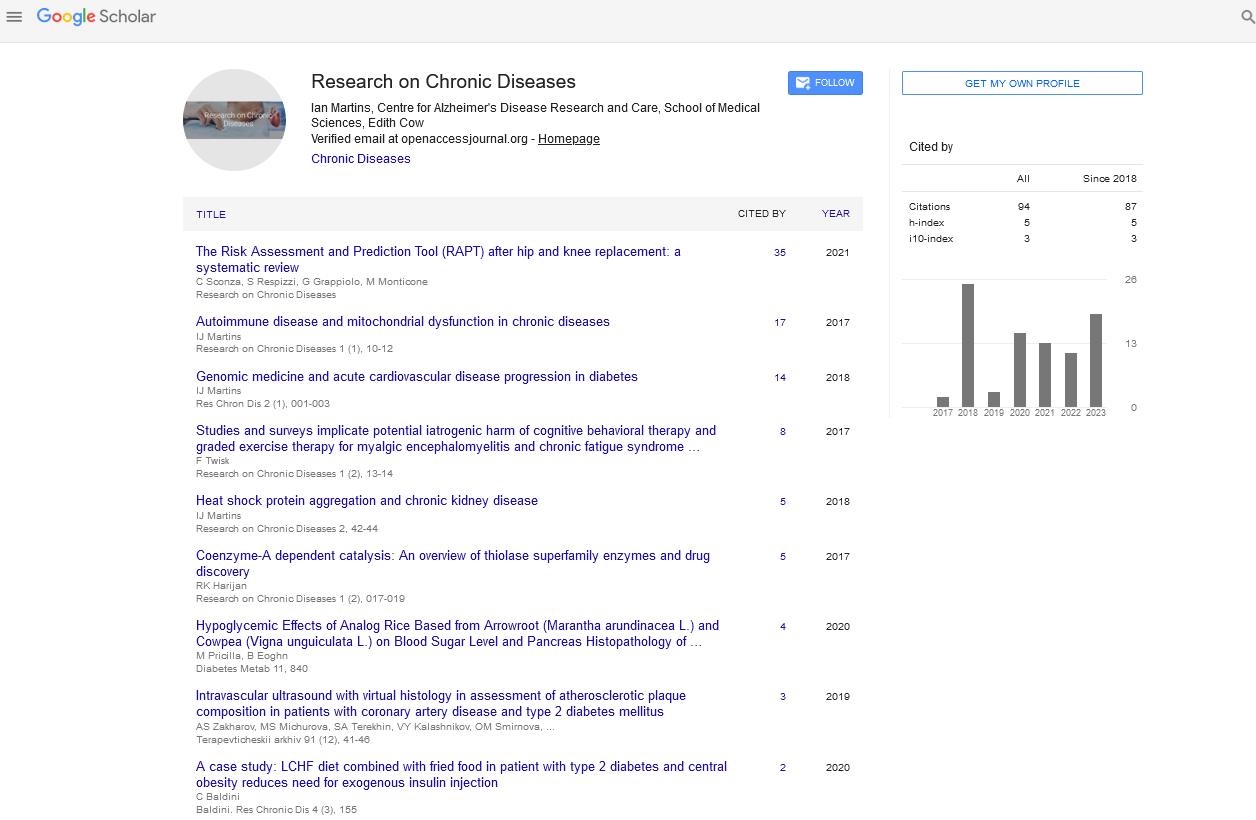Perspective - Research on Chronic Diseases (2023) Volume 7, Issue 6
Navigating Diabetes: Understanding, Managing, and Thriving with the Condition
- Corresponding Author:
- Marwa G. A
Department of Endocrinology, University of Algiers, Algiers, Algeria
E-mail: Hegazy1999@yahoo.com
Received: 14-Nov-2023, Manuscript No. OARCD-23-119488; Editor assigned: 16-Nov-2023, PreQC No. OARCD-23-119488 (PQ); Reviewed: 30-Nov-2023, QC No. OARCD-23-119488; Revised: 07-Dec-2023, Manuscript No. OARCD-23-119488 (R); Published: 14-Dec-2023, DOI: 10.37532/OARCD.2023.7(6).133-135
Introduction
Diabetes, a chronic metabolic disorder, affects millions worldwide and poses a significant public health challenge. This multifaceted condition disrupts the body’s ability to process blood sugar (glucose), leading to various complications if left unmanaged. Understanding the complexities of diabetes, its types, impact, risk factors, and management strategies is vital in addressing this prevalent and pervasive health concern.
The landscape of diabetes
Diabetes is characterized by the body’s inability to properly regulate blood glucose levels. This results from either insufficient insulin production, the body’s inability to use insulin effectively, or both. Insulin, a hormone produced by the pancreas, facilitates the uptake of glucose by cells for energy.
The two primary types of diabetes are
• Type 1 diabetes: This type, often diagnosed in children or young adults, results from the
immune system attacking and destroying the insulin-producing cells in the pancreas. As a
consequence, individuals with type 1 diabetes require lifelong insulin injections for survival.
• Type 2 diabetes: This form accounts for the majority of diabetes cases and generally develops
in adulthood. It involves insulin resistance, where the body’s cells do not respond effectively
to insulin, and the pancreas gradually loses its ability to produce enough insulin.
Impact and symptoms
Diabetes can have profound implications for an individual’s health and well-being. The symptoms can vary based on the type and stage of the condition. Some common symptoms include:
Increased thirst and urination
• Fatigue.
• Blurred vision.
• Slow-healing wounds.
• Tingling or numbness in the extremities.
• Unexplained weight loss (in type 1 diabetes).
• Complications associated with poorly managed diabetes include cardiovascular diseases,
kidney damage, nerve damage, vision loss, and an increased risk of infections.
• Risk factors and prevention.
Several factors contribute to the development of diabetes. Some are modifiable, while others are non-modifiable:
Modifiable risk factors:
• Obesity and physical inactivity.
• Unhealthy diet high in processed foods,
sugar, and saturated fats.
• High blood pressure and abnormal cholesterol
levels.
• Smoking.
Non-modifiable risk factors:
• Family history of diabetes.
• Age (risk increases with age).
• Thnicity (some groups are more at risk).
• Prevention strategies for diabetes often revolve
around a healthy lifestyle. Maintaining a
balanced diet, engaging in regular exercise,
managing weight, avoiding tobacco use,
and managing stress can significantly reduce
the risk of developing type 2 diabetes and
contribute to better management of type 1
diabetes.
Description
Diagnostic approaches
The diagnosis of diabetes involves several tests aimed at measuring blood glucose levels. Common diagnostic tests include:
Fasting Plasma Glucose (FPG) test: Measures blood sugar levels after an overnight fast.
Oral Glucose Tolerance Test (OGTT): Involves drinking a sugary solution, followed by blood sugar level measurements at specific intervals.
Hemoglobin A1c test: Measures the average blood sugar level over the past two to three months.
A diagnosis of diabetes is made when the blood sugar levels consistently exceed normal ranges. Early detection and diagnosis play a crucial role in preventing complications and initiating timely interventions.
Management and treatment strategies
Managing diabetes involves a multifaceted approach aimed at controlling blood sugar levels and preventing complications. Treatment strategies include:
Lifestyle modifications: Healthy eating habits, regular exercise, weight management, and stress reduction are fundamental for diabetes management.
Medications: For type 1 diabetes, insulin therapy is essential. Type 2 diabetes might require oral medications or insulin injections to manage blood sugar levels.
Continuous monitoring: Regular blood sugar monitoring, often through at-home glucose meters, aids in keeping blood sugar levels in check.
Education and support: Patient education and support programs help individuals better manage their condition and make informed decisions about their health.
Technological advancements and diabetes care
Advancements in technology have revolutionized diabetes care. Devices such as Continuous Glucose Monitors (CGMs) and insulin pumps offer real-time glucose readings and automated insulin delivery, enhancing precision and ease in managing blood sugar levels.
Telemedicine and digital health platforms provide opportunities for remote consultations, education, and continuous monitoring, improving access to care and support for individuals with diabetes, especially in remote or underserved areas.
Impact on mental health
Living with diabetes can impact an individual’s mental health. The daily management, potential complications, and lifestyle changes required can lead to stress, anxiety, and depression. Support networks, counseling, and mental health care are integral in addressing the psychological challenges faced by individuals managing diabetes.
Future directions and innovations
The future of diabetes care emphasizes personalized and precise interventions. Advancements in research, including genetic studies, regenerative medicine, and novel drug therapies, offer hope for improved treatment outcomes and prevention strategies.
The exploration of artificial pancreas systems, bioengineering of pancreatic cells, and stem cell therapy shows promise in revolutionizing diabetes care, offering potential cures or longterm management solutions.
Conclusion
Diabetes, a prevalent and multifaceted health condition, significantly impacts individuals’ lives and requires careful management and support. Understanding the types, symptoms, risk factors, diagnostic approaches, and treatment strategies is pivotal in addressing this pervasive health concern.
As healthcare continues to evolve, the focus on prevention, education, technological advancements, and personalized care will define the future of diabetes management. Raising awareness, fostering proactive health measures, and providing support for individuals affected by diabetes are key in promoting well-being and a healthier future for all.
